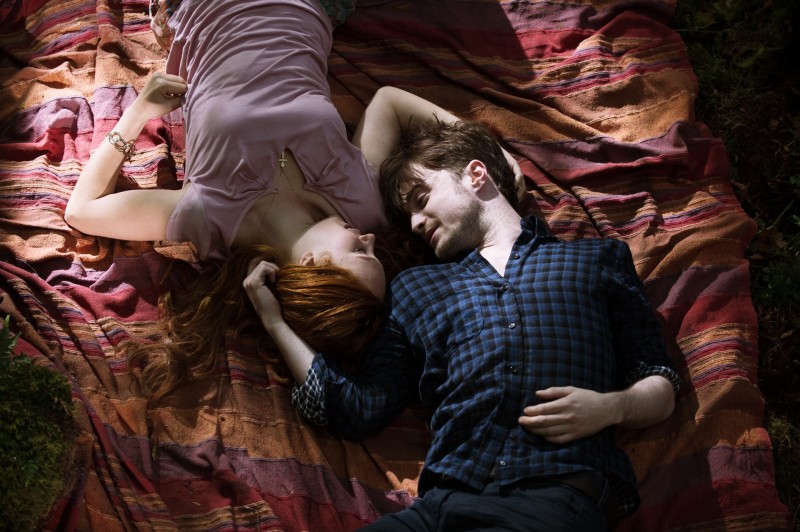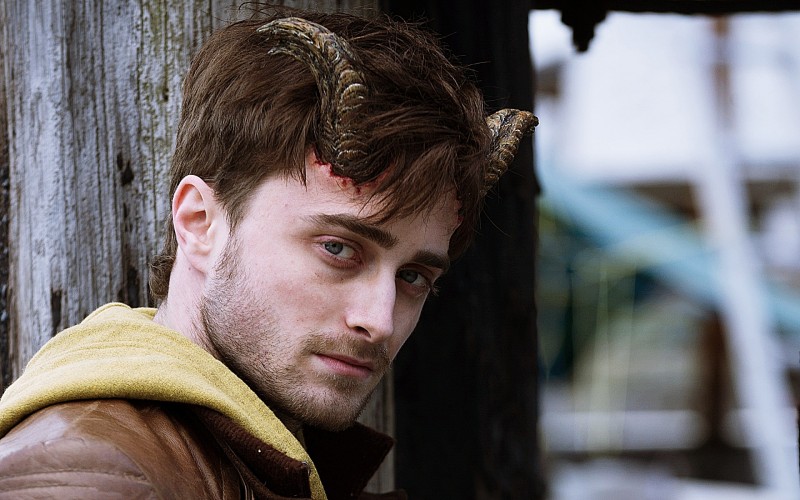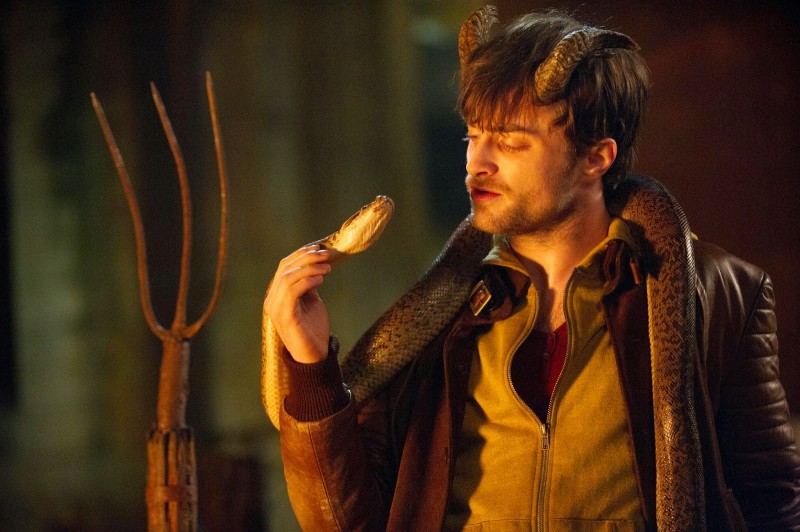Horns Review
"A creative concept bogged down by clunky dialogue and over exposition"
Writer/Director Alexandre Aja is known for his blood-splattered low budget horror films, leading back to his breakout success,
Haute Tension (“
High Tension”). A member of the so-called “Splat Pack” alongside directors Eli Roth, James Wan, and Rob Zombie, Aja has carved out a name for himself in one of the most brutally gory corners of the horror genre.
 Horns
Horns is a departure from form for Aja, in its fairy-tale imagery and almost complete lack of violence and death. Playing much like a Brothers Grimm
Gone Girl,
Horns awkwardly toes a line between cute, vividly colored cinematography and an unconvincingly serious tone.
In an opening shot reminiscent of Tim Burton's
Alice in Wonderland, Aja's camera finds lovers Ig Perrish (Daniel Radcliffe) and Merrin Williams (Juno Temple) alone in a moss-covered wood. As the camera zooms in past the lovers, it sinks into the Earth (nicely accenting narration by an American-accented Radcliffe) to find itself upside down panning upwards into Ig's kitchen wherein he is passed out on the floor. As the camera and Ig right themselves, we learn that Ig has been accused of murdering Merrin, and, through a series of overly expositional vignettes and flashbacks, come to know that he is innocent (although, the complete lack of subtlety assures the audience of this within the first few frames). When Ig sprouts horns and develops the powers of the Devil, we find that his opening line, “sometimes, when you go through hell, the only way out is to walk deeper into the fire” is much more than mere conjecture.

Apart from the establishing shot, the rest of the film's technique and visual style lack any kind of originality. Borrowing tricks from the likes of Edgar Wright, Terry Gilliam and various others, Aja sticks to a standard template of filmmaking. The cinematography by Frederick Elmes heightens the uneasy fairytale glow of the film; much like the television or projector somehow reverted to its “factory display” mode, cranking up contrast and brightness to cartoonish levels. This could have added a fun charm to the film, but is instead degraded by its disparity with the tone, and becomes a confusing addition to this already messy film.
Adapted from Joe Hill's novel by Keith Bunin,
Horns aligns itself with a skewed ethical code, strictly defining sinful and moral behavior. When Ig starts to understand his devilish powers, he finds that his presence forces others to divulge their deepest “sinful” fantasies and lose connection with their humanistic tendencies. Ranging from insurance fraud to matricide, the inner most thoughts of Ig's neighbors and friends run the gamut of “sin.” Distressingly enough, homosexuality is amongst these “sins,” and although it is downplayed by the violent lustfulness between two police officers, positioning it alongside federal crimes and morally reprehensible behavior is a careless and cheap way to get laughs.
Questionable choices aside, the screenplay and overall plot comprise one of the more unique stories in recent film. It is certainly interesting to watch the depraved actions of the people around Ig as they live out their darkest “fantasies” and succumb to their animalistic nature. His deceitful appearance (as his doctor notes, Ig's horns are hardly memorable and easy to forget when one is not looking at him) adds a laughable charm to the plot as Ig struggles to cope with his satanic appearance.

Unfortunately, all of the film's conceptual originality is destroyed by ham handed and unnecessary dialogue, flashbacks, allusions, and general audience “hand holding” throughout the narrative. Nothing is left to the imagination in this wildly imaginative story, with explanations being delivered by narration or clunky additions to the dialogue. Ig's name (short for Ignatius) is Latin for “fiery one,” – the boy that becomes the embodiment of the Devil is NAMED “the fiery one.” Flipping back-and-forth from the Ig's childhood, to the present, to the recent past (via Ig's new found power of mind reading) constantly overstep their necessity, and remove all questionable aspects of the narrative, consistently undermining the audience's intelligence.
Horns is a fantastic example of a film that takes an original concept, and beats it into the ground with hackneyed dialogue and shoe-horned explanations. With its dismissal of any thought provoking or intriguing abstractions,
Horns belittles its audience – completely losing any semblance of meaning or audience speculation.
Pros
- Very original story
- Some clever camerawork
Cons
- Far too clunky
- Wrong choice for Daniel Radcliffe and his bizarre American accent
- Overly preachy without concrete take-aways or morals
 Horns is a departure from form for Aja, in its fairy-tale imagery and almost complete lack of violence and death. Playing much like a Brothers Grimm Gone Girl, Horns awkwardly toes a line between cute, vividly colored cinematography and an unconvincingly serious tone.
In an opening shot reminiscent of Tim Burton's Alice in Wonderland, Aja's camera finds lovers Ig Perrish (Daniel Radcliffe) and Merrin Williams (Juno Temple) alone in a moss-covered wood. As the camera zooms in past the lovers, it sinks into the Earth (nicely accenting narration by an American-accented Radcliffe) to find itself upside down panning upwards into Ig's kitchen wherein he is passed out on the floor. As the camera and Ig right themselves, we learn that Ig has been accused of murdering Merrin, and, through a series of overly expositional vignettes and flashbacks, come to know that he is innocent (although, the complete lack of subtlety assures the audience of this within the first few frames). When Ig sprouts horns and develops the powers of the Devil, we find that his opening line, “sometimes, when you go through hell, the only way out is to walk deeper into the fire” is much more than mere conjecture.
Horns is a departure from form for Aja, in its fairy-tale imagery and almost complete lack of violence and death. Playing much like a Brothers Grimm Gone Girl, Horns awkwardly toes a line between cute, vividly colored cinematography and an unconvincingly serious tone.
In an opening shot reminiscent of Tim Burton's Alice in Wonderland, Aja's camera finds lovers Ig Perrish (Daniel Radcliffe) and Merrin Williams (Juno Temple) alone in a moss-covered wood. As the camera zooms in past the lovers, it sinks into the Earth (nicely accenting narration by an American-accented Radcliffe) to find itself upside down panning upwards into Ig's kitchen wherein he is passed out on the floor. As the camera and Ig right themselves, we learn that Ig has been accused of murdering Merrin, and, through a series of overly expositional vignettes and flashbacks, come to know that he is innocent (although, the complete lack of subtlety assures the audience of this within the first few frames). When Ig sprouts horns and develops the powers of the Devil, we find that his opening line, “sometimes, when you go through hell, the only way out is to walk deeper into the fire” is much more than mere conjecture.
 Apart from the establishing shot, the rest of the film's technique and visual style lack any kind of originality. Borrowing tricks from the likes of Edgar Wright, Terry Gilliam and various others, Aja sticks to a standard template of filmmaking. The cinematography by Frederick Elmes heightens the uneasy fairytale glow of the film; much like the television or projector somehow reverted to its “factory display” mode, cranking up contrast and brightness to cartoonish levels. This could have added a fun charm to the film, but is instead degraded by its disparity with the tone, and becomes a confusing addition to this already messy film.
Adapted from Joe Hill's novel by Keith Bunin, Horns aligns itself with a skewed ethical code, strictly defining sinful and moral behavior. When Ig starts to understand his devilish powers, he finds that his presence forces others to divulge their deepest “sinful” fantasies and lose connection with their humanistic tendencies. Ranging from insurance fraud to matricide, the inner most thoughts of Ig's neighbors and friends run the gamut of “sin.” Distressingly enough, homosexuality is amongst these “sins,” and although it is downplayed by the violent lustfulness between two police officers, positioning it alongside federal crimes and morally reprehensible behavior is a careless and cheap way to get laughs.
Questionable choices aside, the screenplay and overall plot comprise one of the more unique stories in recent film. It is certainly interesting to watch the depraved actions of the people around Ig as they live out their darkest “fantasies” and succumb to their animalistic nature. His deceitful appearance (as his doctor notes, Ig's horns are hardly memorable and easy to forget when one is not looking at him) adds a laughable charm to the plot as Ig struggles to cope with his satanic appearance.
Apart from the establishing shot, the rest of the film's technique and visual style lack any kind of originality. Borrowing tricks from the likes of Edgar Wright, Terry Gilliam and various others, Aja sticks to a standard template of filmmaking. The cinematography by Frederick Elmes heightens the uneasy fairytale glow of the film; much like the television or projector somehow reverted to its “factory display” mode, cranking up contrast and brightness to cartoonish levels. This could have added a fun charm to the film, but is instead degraded by its disparity with the tone, and becomes a confusing addition to this already messy film.
Adapted from Joe Hill's novel by Keith Bunin, Horns aligns itself with a skewed ethical code, strictly defining sinful and moral behavior. When Ig starts to understand his devilish powers, he finds that his presence forces others to divulge their deepest “sinful” fantasies and lose connection with their humanistic tendencies. Ranging from insurance fraud to matricide, the inner most thoughts of Ig's neighbors and friends run the gamut of “sin.” Distressingly enough, homosexuality is amongst these “sins,” and although it is downplayed by the violent lustfulness between two police officers, positioning it alongside federal crimes and morally reprehensible behavior is a careless and cheap way to get laughs.
Questionable choices aside, the screenplay and overall plot comprise one of the more unique stories in recent film. It is certainly interesting to watch the depraved actions of the people around Ig as they live out their darkest “fantasies” and succumb to their animalistic nature. His deceitful appearance (as his doctor notes, Ig's horns are hardly memorable and easy to forget when one is not looking at him) adds a laughable charm to the plot as Ig struggles to cope with his satanic appearance.
 Unfortunately, all of the film's conceptual originality is destroyed by ham handed and unnecessary dialogue, flashbacks, allusions, and general audience “hand holding” throughout the narrative. Nothing is left to the imagination in this wildly imaginative story, with explanations being delivered by narration or clunky additions to the dialogue. Ig's name (short for Ignatius) is Latin for “fiery one,” – the boy that becomes the embodiment of the Devil is NAMED “the fiery one.” Flipping back-and-forth from the Ig's childhood, to the present, to the recent past (via Ig's new found power of mind reading) constantly overstep their necessity, and remove all questionable aspects of the narrative, consistently undermining the audience's intelligence.
Horns is a fantastic example of a film that takes an original concept, and beats it into the ground with hackneyed dialogue and shoe-horned explanations. With its dismissal of any thought provoking or intriguing abstractions, Horns belittles its audience – completely losing any semblance of meaning or audience speculation.
Unfortunately, all of the film's conceptual originality is destroyed by ham handed and unnecessary dialogue, flashbacks, allusions, and general audience “hand holding” throughout the narrative. Nothing is left to the imagination in this wildly imaginative story, with explanations being delivered by narration or clunky additions to the dialogue. Ig's name (short for Ignatius) is Latin for “fiery one,” – the boy that becomes the embodiment of the Devil is NAMED “the fiery one.” Flipping back-and-forth from the Ig's childhood, to the present, to the recent past (via Ig's new found power of mind reading) constantly overstep their necessity, and remove all questionable aspects of the narrative, consistently undermining the audience's intelligence.
Horns is a fantastic example of a film that takes an original concept, and beats it into the ground with hackneyed dialogue and shoe-horned explanations. With its dismissal of any thought provoking or intriguing abstractions, Horns belittles its audience – completely losing any semblance of meaning or audience speculation.